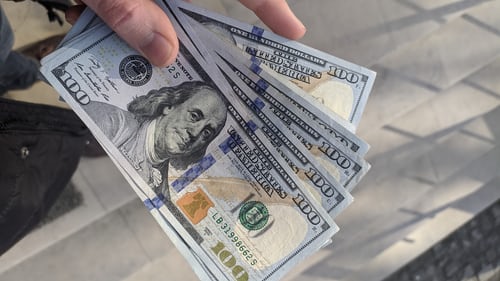Last Updated on May 21, 2021 by James W
‘Dollar is the national currency of?’,
You ask a citizen of any country in this world, and they are likely to yell out, ‘The U.S.A’, or ‘America’ or ‘U.S.A.’ without skipping a heartbeat.
And if your very next question is, ‘Krona is the national currency of?’ or ‘Zloty is the national currency of?’
Only a select few might probably answer, or they’d be quick to google it before answering.
What makes the American Dollar a worldly phenomenon? Is the dollar popularity a consequence of the omnipresence of Hollywood Movies? Partly, Maybe.
But what makes the dollar the most sought-after currency? What is the fundamental difference between the dollar and other financial currencies?
To understand how the dollar came to be the ultimate financial currency for the whole world, we shall have to take a walk down history lane.
The Birth Of The Petrodollar
The year was 1979; the the United States and Saudi Arabia had negotiated the United States-Saudi Arabian Joint Commission on Economic Cooperation. The Kingdom Of Saudi Arabia had agreed to accept U.S. dollars instead of gold for oil contracts. And the U.S. dollars would be recycled back to America through contracts with U.S. companies.
Thus, the ‘Petrodollar’ was born.
The Petrodollar can be defined as any U.S. dollar paid to oil-exporting countries in exchange for their oil. As a result of this, almost all international transactions, including oil, are priced in dollars. Oil-exporting nations receive dollars for their exports in place of their own currency.
This makes the dollar a preeminent global currency.
Since most oil-exporting nations own their oil industries, their national income depends on the dollar’s value. If the value of the dollar falls, so does their government’s revenue.
To avoid this, most of these oil exporters peg their currencies to the dollar. This way, a fall in the dollar’s value results in a consequential fall in the price of all their domestic goods and services, which helps these countries avoid the extremes of inflation or deflation.
Benefits Of Petrodollar To The U.S.A.
The Petrodollar has proven to be incredibly beneficial for both the U.S. and its citizens.
A significant percentage of the dollars that are accumulated by the oil-exporting countries return to the U.S. in a process called “Petrodollar Recycling.” The excess dollars that pile up in the oil-exporting countries can be spent on anything, but most are often invested in U.S. dollar-denominated assets. This creates liquidity for the financial markets in the U.S., keeping stock prices up. Recycled dollars also contribute to keeping interest rates low, allowing more Americans to own more homes than citizens of any other nation.
Decoding The Invincibility Of The Dollar
Eswar Prasad, the senior professor of trade policy at Cornell University and senior fellow at the Brookings Institution, has penned down a book called ‘The Dollar Trap: How the U.S. Dollar Has Tightened Its Grip On Global Finance.’ This book explains in detail how the formation of the Petrodollar has had an ironic yet cushioning effect on the U.S. Dollar even in times of global financial crises that have had their origin in the U.S.
When asked in an interview by Forbes as to why the book title contained the word trap than any other word, Prasad answered in the following words:
“The curious aspect here is that anytime there is financial turmoil, even perpetrated by the U.S. policies, that leads people to come to the U.S. for safety. So, for instance, when we had the debt ceiling negotiations in October of 2013; one might think that the possibility of a U.S. default, even if it was going to be a short-lived and technical default, should lead people to flee from the U.S. Treasury securities and the dollar. Instead, because there was no other place to go, people came to the U.S. to hide from the turmoil.
And that’s the paradox that when the U.S. policies create turmoil, people come back to the U.S. And just given the sheer amount of the U.S. Treasury securities and other dollar assets that the rest of the world holds, the rest of the world doesn’t want the dollar to plunge in value. because if it did, then they would get hurt, in some ways even more than the U.S.”
In his reply, Mr. Prasad precisely explains how due to the lack of ‘no other place to go,’ wealthy people from countries all over the world heavily rely on the U.S. Dollar.
So if it is not the U.S. that has to pay the price for its wrongdoings, it is evident that someone else has to pay the price eventually.
Who then pays the price? It is primarily the third world countries and the countries that supply labor to the oil-exporting countries.
Petrodollar: Policies And Politics
There have been multiple attempts towards shifting to other currencies from petrodollars.
Despite being the largest foreign holder of the dollar, China has often called for the replacement of the dollar as the global currency. Today, China still influences the dollar by pegging its currency, the yuan, to it.
In 2018 Venezuela said that it would start selling its oil in the yuan, euro, and other currencies.
In 2019, a bill—called NOPEC—that would allow the U.S. Justice Department to pursue antitrust action against OPEC for manipulating oil prices was introduced in the U.S.A. Saudi Arabia immediately threatened to abandon petrodollars if the U.S. moved forward with it. Thus, the unstable nature of the global energy market could result in a decisive end to the U.S.-Saudi petrodollar agreement.
What Does The Future Of Petrodollar Look Like?
There is a looming threat over the Petrodollar in the form of Renewable Energy.
As Nations are uniting to fight greenhouse gas emissions and Global warming, their shift to electric vehicles and solar or wind power generation threatens the profitability of oil-producing nations. The United States is far behind China and the European Union in these technologies. As a result, the Petrodollar might lose the title of the world’s dominant currency sooner or later.




